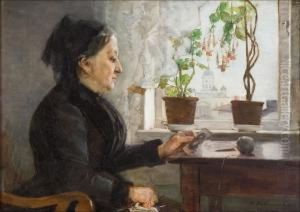Helena Westermark Paintings
Helena Westermark was a Swedish writer and feminist born on May 20, 1857, in Visby, Sweden. She is best known for her work in advancing women's rights and her literary contributions, which often centered around social issues and women's roles in society during the late 19th and early 20th centuries.
Westermark's upbringing was in a progressive family that valued education and intellectual pursuit, which was relatively rare for women at the time. These formative years were crucial in shaping her views on gender equality and social reform. Her father, Nils Westermark, was a physician, and her mother, Betty Westermark, was a strong influence on her feminist ideals.
Westermark never married, which was an unconventional choice that allowed her a degree of independence uncommon for women of her era. She began her writing career with articles in newspapers and journals, discussing social issues, and advocating for women's rights. Her literary work extended to novels and plays, which she used as vehicles to explore societal norms and to critique the limitations placed on women in her society.
Her activism was not limited to her writing. Westermark was involved in various feminist organizations, including the Fredrika-Bremer-Förbundet, an association named after the Swedish writer and feminist Fredrika Bremer, which aimed to improve women's rights and conditions. She also engaged in public speaking, where she could directly address issues of women's suffrage, education, and legal rights.
Helena Westermark's influence extended beyond her death in 1941. Her legacy is that of a pioneering feminist and social reformer who used her voice and pen to challenge the status quo and advocate for a more just and equitable society. She remains an important figure in the history of Swedish feminism and literature.
